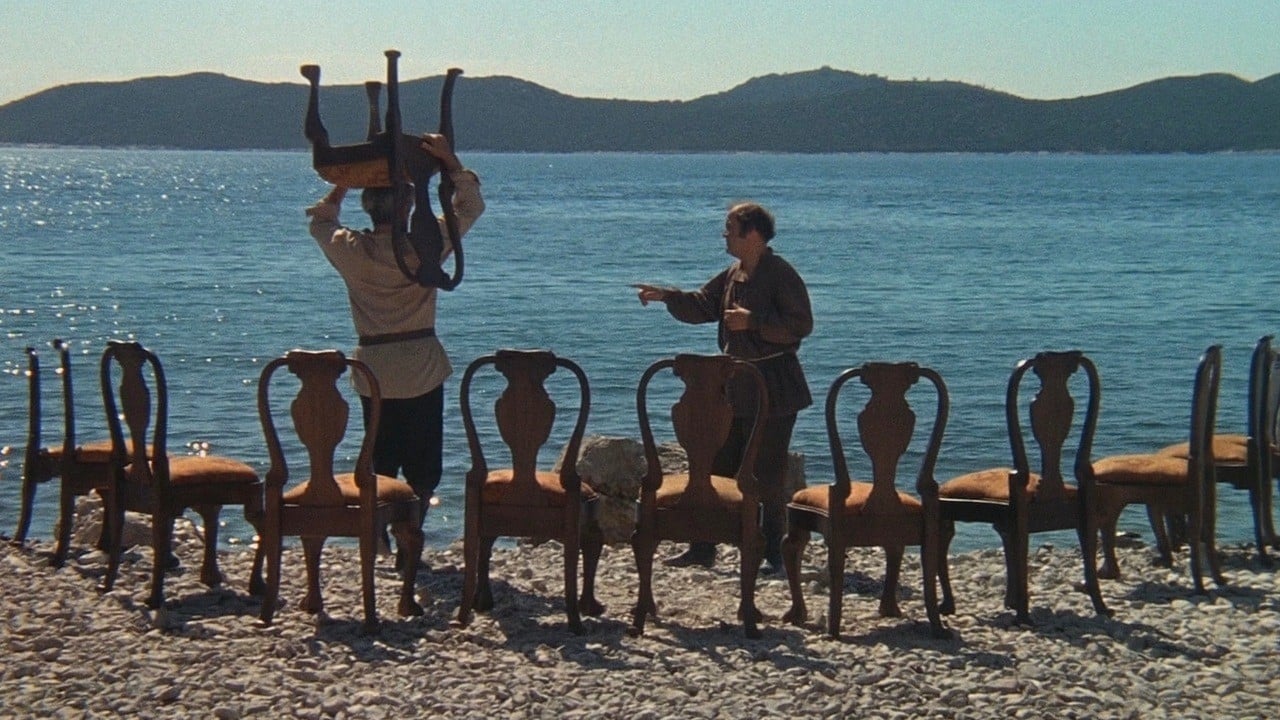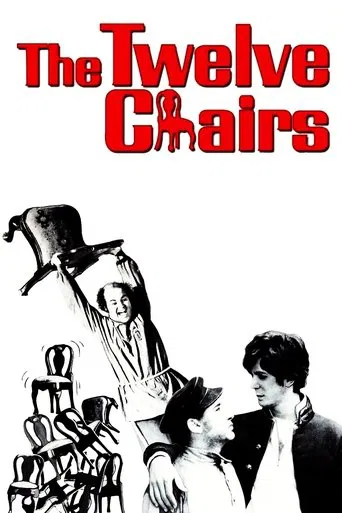

Dreadfully Boring
... View Moreif their story seems completely bonkers, almost like a feverish work of fiction, you ain't heard nothing yet.
... View MoreThe movie's neither hopeful in contrived ways, nor hopeless in different contrived ways. Somehow it manages to be wonderful
... View More.Like the great film, it's made with a great deal of visible affection both in front of and behind the camera.
... View MoreIt's 1927 Soviet Union. Ippolit Vorobyaninov (Ron Moody) is a poor Russian aristocrat who is told by his dying mother-in-law that she hid her jewels in one of her twelve chairs which are now gone. Ostap Bender (Frank Langella) is a con-man from the streets. He befriends Tikon (Mel Brooks) and then bullies his master Ippolit into joining him in his search. The priest Father Fyodor (Dom DeLuise) brought in to give the Last Rites also tries to find the chairs.It's a satire based on Ilf and Petrov's "The Twelve Chairs". The film has a bit of slapstick and a bit of stinging rebuke of the communist system. It's not as vulgar as his later works. That's probably due to the need to follow the source material. It does lack a good rooting interest. Frank Langella is not a fun con-man. His intensity doesn't allow the comedy to flow easily. He's a serious actor and not really a comedian. This is interesting with a few good chuckles.
... View MoreThis movie is not even close to the REAL classic 12 Chairs 1971 movie by Leonid Gaiday. The problem is not in the director or actors. Brooks may be a good director, whatever, the facts are that American nation will never understand the classic Russian humor the way it's meant to be.The Russian 1971 version of 12 chairs together with "adventures of Shurik" is widely considered to be simply the best Russian comedy of all time. Watching American 12 chairs version would be the same as forcing Pierre Richard to play a Schwarz's roles. Ridicioulus...I can't believe that people like this movie and have read the novel at the same time, this is hard to understand...Don't watch this movie! Watch classic 1971 and 1976 Russian movies instead!
... View MoreIn his lifetime Mel Brooks has created many motion pictures which have established him as an artistic genius. "The Twelve Chairs" is another milestone for him. From the very beginning of this film, to its ending, there is a sense of serious, but humanistic brilliance. The era is the aftermath of the Russian Revolution and a dying woman wants to clear her conscience and reveal her greatest sin. As thousands of the nobility are fleeing for their lives, she decides to hide her family's fortune inside the lining of a set of handcrafted chairs. That secret is her dying revelation and is said unfortunately into more than one set of ears. This initiates a mad dash for the lost treasure. Seeking the cache of jewels are three intrepid, but greedy set of characters. The first is incredibly talented Ron Moody who adroitly and brilliantly plays the legitimate, greedy and opportunistic son, Ippolit Vorobyaninov. Once a Marshall of the nobility, he is now reduced to a minor banking clerk and opportunistic son-in-law. Frank Langella is superior as Ostap Bender, a handsome, street-wise, traveling Gypsy, who also wants in on the treasure hunt. Finally there is Dom DeLuise who plays Father Fyodor, an Orthodox but impoverished monk who believes, God will help him find the elusive chair first. What the trio soon discover is that the chair is one of Twelve which have been scattered across the vast twelve thousand miles of Russia. If Mel Brooks sought to create an amusing memorable movie, he succeeded. By the time one reaches the end of this film, we realize . . . . a Classic has been born. ****
... View MoreIt is the forgotten Brooks movie. Probably because it has the most controlled script story, and had the least wild, satyric inventiveness of any of his films. After he wrote and directed the original THE PRODUCERS, Brooks did not do another film for a few years. The second one was this one set in the post-Russian Revolution period in the Soviet Union. Ron Moody (Fagin in the musical OLIVER) is a minor Tsarist nobleman who discovers, when attending his mother-in-law on her death bed, that she hid her fortune in jewelry in one of the dining room chairs. There were a set of twelve chairs, and they were appropriated by the government to be given to deserving members of the proletariat. Moody discovers that his mother-in-law did confess this to one person besides him: the local Russian Orthodox Priest (Dom DeLuise). Moody finds the latter a difficult opponent to beat to the fortune first. By chance he falls in with a young swindler (Frank Langella) and he and Langella pursue the chairs, and also send DeLuise on a wild goose chase following a second set of similar chairs. What we get is a view of the Soviet Union in 1928, as the Civil Wars died out and the regime consolidated power. Trotsky's name is now dismissed (as a street shows). The stage is dominated by the state oriented drama that is anti-capitalist. Witness the performance of Andreas Voutsinas - the original "Carmen Ghia" in the first PRODUCERS, as the government backed manager of the theater group that Moody and Langella join. There is a life and death threat behind comments he gives to one of the stage crew he controls. We also see how the common people try to cope with the changes - being sent across country on government sponsored jobs - to houses that the government may furnish. Brooks has his first role in his own films in this one - as Tikhon, the drunken, ex-servant of Moody. He receives a slap from the latter, and considers it exactly like a hug. Like IT'S A MAD, MAD, MAD, MAD WORLD, THE TWELVE CHAIRS looks at the antics people will go through for hidden wealth. Langella, who is a street criminal anyway, is the only sane member of the three treasure seekers. He is a realist (the first really serious one in Brooks' films), and has adapted to the new conditions fairly easily by living on his considerably keen wits. He realizes that he is hampered as well as helped by his alliance with Moody, but manages to figure out how to live with Moody as best as possible. Moody has become a bureaucrat to survive in the new regime (he's suspect as an aristocrat), but he still has his pretenses. It takes the events he shares with Langella for him to finally give up his pretenses. Together both men find out what is really worthwhile about living. DeLuise is less lucky. He just discovers the perils of being a loner.
... View More